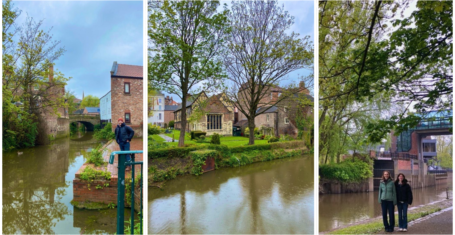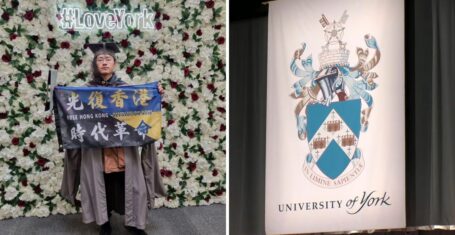
‘I don’t pay £27k for a white student to use uni WiFi to call me a n****r’
Students are not happy with the way campus racism is being handled, something needs to change
Amara was hosting her weekly student radio show when she received a message through the anonymous message board DJs use to take song requests.
"Well if you can say hola I can say n***a" someone had sent to her. Amara checked her Facebook, her notifications had blown up with a fellow York student complaining about her use of the world 'hola' in a Facebook status promoting her radio show.
"Don't say hola if you're an imperialist English native" said Rafel, a York third year.
Amara then invited Rafel to discuss the issue, to which he replied: "Sorry I actually have work to do maybe another time my n***a." The university launched an investigation into the incident.

This incident follows the saga in Sheffield last month, where at least four racist incidents were reported in four weeks. A banana was thrown at a black student at Varsity, another was referred to as a 'monkey' by security staff, and someone wrote "[There are] too many Asians" on a library whiteboard.
After an investigation into the banana-throwing incident, the University of Sheffield decided it was 'not a racist incident' and the perpetrator was given ten hours of volunteering work as punishment.
Speaking at a protest against how the university handled the incident, Tyrell Pearce, the student who had a banana thrown at him, said:
"I was at Varsity and got a banana thrown at me. It's been over a month now, it's been about six weeks, and today I got a phone call from the University about the incident."
More examples from earlier this year include the racist group chat in Exeter and the Bournemouth fresher who was described as a "big black ape" in another racist group chat.
Racism is still clearly a problem across UK university campuses and it doesn't help when those affected feel that the university is unwilling to help.
Amara, has accused the university of "enshrining and protecting racist students through their policy while forcing students that have been victims of racial abuse to chase up and push for adequate resolutions."
The University of York has apparently concluded their investigation into the student, with a verdict expected soon.
However, Amara and YUSU BAME Officer Hannah Joseph-Asikhia have both told The Tab of their dissatisfaction with how the university have dealt with the incident, and campus racism in general.
Amara posted an update on the situation to Twitter, saying: "Even when the university acknowledges that racism happens on their campus they can’t say sorry. Imagine this happened two weeks ago and the uni has yet to tell me their sorry for what happened.
Amara went on to speak about how the university are not doing enough to tackle racism: "I’m fucking fuming. I pay my fees same way as anyone else. And I’ll tell you this @UniOfYork I don’t pay £27k for a white student to use uni WiFi (that my fees pay towards) to call me a n****r. Is everyone okay over there?
"Instead I’ve had to take my case to the police to spur the university into actually making moves towards protecting the small amount of black students already here."
The YUSU BAME Network have also criticised the university from their official Twitter account, saying that while the demand for diversity at York "borders on tokenism", the environment for BAME students at York is so hostile the uni are "not even able to deal with one incident of racism".
The Tab spoke to Hannah Joseph-Asikhia, one of the YUSU BAME reps, about her experiences of racism and what must be done in order to combat racism on our campus.
Hannah told The Tab: "There are more BAME people coming to the uni but the environment here is not necessarily a safe environment for them. The university wants diversity but this is largely just tokenism. There aren't things in place for Afro-Caribbean students – for example, we have to travel to Leeds in order to get hair products suitable for our hair and Afro-Caribbean food."
When asked about her own experiences of racism at York, Hannah told us "Someone called me the N-word on a night out – it happens a lot more than people think. People don't take further action because they're too busy with uni work and don't think that the University will do something. The people who call you the N-word are still walking around campus and this can be a triggering thought for people.
The onus is unfairly on the victim to make sure that something is done about the offender rather than the uni."

YUSU BAME Officer Hannah Joseph-Asikhia who has spoken out about racism at York
Hannah also elaborated on what she believes needs to be done in order to change the culture surrounding racism at University.
"The first step is to sign the anonymous reporting petition which has been started as part of the #RespectYork campaign. This is an important first step but far from the last – we are one of the last Universities to implement this and as a result York seems to be one of the worst unis for dealing with racism."
Hannah continued, "We can also start calling out the University on social media – for example, when I tweet about an issue I will tag the University in my tweets as it is when their reputation is on the line that they take action. They say that they want more diversity but aren't willing to put in the time and money needed to create a safe environment for BAME students."
Speaking more generally about her experiences over her three years at York, Amara said: "I’m tired. So fucking tired. I’ve been here three years and I’ve dealt with the stares and the racist socials and locals in town who’ve never seen a black person before. And now I have to deal with it on the fucking radio?!"
"The University of York is NOT a place where minority groups are represented, protected or safe. International university my backfoot. My bame babes take your money elsewhere where university’s follow through and fully protect you.
"It’s time for a policy change at the Uni of York. How can you as a big man uni in 2018 not have a zero tolerance policy towards racism Koen Lamberts this is your university do you actually think this is okay?
"Coming to uni when you’re black is hard enough. Do you really think I woulda come here knowing in my final term as I’m about to submit my dissertation I’d be dealing with the police and uni administration? Like I don’t have work to do?!"
Speaking to The Tab, Amara said she thinks her tweets have "kicked up enough of a fuss for them start acting a bit faster because the investigation is now over. I'm just waiting to here on their decision now."
Amara also said she's been able to have to have a meeting with the university registrar and some senior staff in order to discuss changes to the way the university deals with racist incidents and "how the university protects BAME students and actually acknowledges how difficult it is to be black in York".
The University of York told The Tab: “The University of York does not tolerate instances of race hate and racist behaviour. We are concerned to ensure that our campus environment is one in which all students feel safe.
“In a meeting earlier this week, the University’s Academic Registrar and the Director of Colleges have personally apologised to the affected student that she has had this experience.
“The University took this incident very seriously and immediately launched an investigation. A disciplinary process is close to conclusion and we have been engaging with the students concerned throughout.
“Support has been offered to the affected student which included a number of meetings with senior University staff.
“The University Registrar, Academic Registrar and Head of Equality and Diversity are meeting the York Student Union President and YUSU’s BAME officers to understand what further measures we can collaboratively put in place to ensure that we have a truly inclusive and welcoming community for all students.
“Measures include ensuring that students understand where they can report any concerns they have and the support that is available to them.
“We are also reviewing our student orientation and induction events to ensure that students appreciate and respect diversity, and have a clear understanding of the standards of behaviour expected to create a positive environment which is fair, welcoming and inclusive.”









































